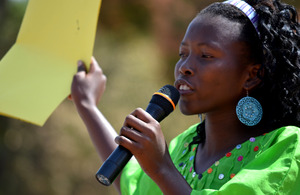UK to help end female genital mutilation
Britain announced the biggest ever international investment in eradicating the practice

Speaking at a public declaration for the abandonment of female genital cutting (FGC) in Ziguinchor, Senegal. Picture: Tostan International
Britain will work to end female genital mutilation (FGM) worldwide within a generation, the government vowed today as International Development Minister Lynne Featherstone announced the biggest ever international investment in eradicating the practice.
Speaking in New York at the UN Commission for the Status of Women, Ms Featherstone said it was time to back the African-led movement to break the taboo on FGM.
The new programme, worth up to £35 million, which is expected to reduce FGM by 30% in at least 10 priority countries in the next 5 years, will:
-
support work to end FGM in at least fifteen countries by working directly within local communities
-
work with governments and traditional leaders to back laws to end FGM
-
fund research into the most cost-effective approaches to ending FGM, to make sure our work has the maximum impact
-
support diaspora communities in the UK to help change practices in their countries of origin
Three million girls a year are at risk of FGM in Africa alone and up to 140 million women and girls worldwide have undergone FGM.
Lynne Featherstone said:
“It is time to break the taboo on genital mutilation. For too long the international community has been cowardly on this subject, finding it too difficult to tackle. Girls around the world have suffered a lifetime of damage, sometimes even death, as a result. Female genital cutting is one the worst kinds of gender violence. We know most families want the best for their children and education, and changing cultural norms, rather than merely condemnation, is key.
“The programme announced today – DFID’s first-ever dedicated programme on FGM – could see a 30% reduction in FGM in the next five years. My aim is to ensure that very soon FGM is as outdated a practice as foot-binding. We mustn’t be satisfied until we’ve seen the end of FGM worldwide.”